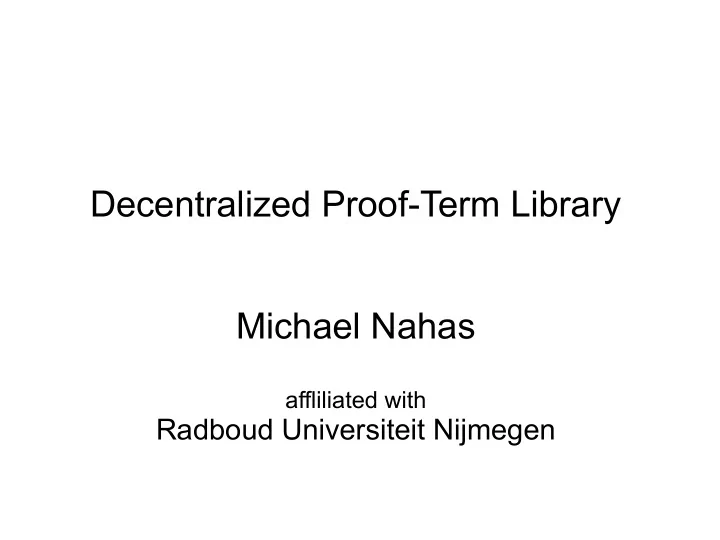

Decentralized Proof-Term Library Michael Nahas affliliated with Radboud Universiteit Nijmegen
New to the Research Field Expert in: ● File systems ● Distributed computing ● Caching ● Error Correction ● ...
New to the Research Field Not an expert (yet) in: ● ITP ● Type Theory ● Coq ● Isabelle/Isar, Isabelle/HOL, ACL2, Agda, ... ● Matita
New to the Research Field Not an expert in: ● Libraries ● Machine Learning ● Information Retrieval Decentralized Proof-Term Library File System ?
What is a Library? A storage place for information Examples: ● Library (books) ● Dictionary (words + definitions) ● Phonebook (phone# and addresses) ● Webserver (hypertext) ● IMDB, Wikipedia, … Netflix! Facebook?
Why do we want a library? Duplicate work! “I know someone has already proved this! … or something similar.” “nanos gigantum humeris insidentes” - Bernard of Chartres
Processes of a Library ● Collect ● Authenticate ● Index + Store ● Maintain ● Serve Users: – Browsing – Learning – Searching
Serving Users ● Browsing (meta-data + priorities) – “paging through the ToC / Index” – “reading the abstract” ● Learning (copying data into brain (“cache”)) – “reading a textbook / paper” ● Searching (accessing data without caching) – “finding the citation for this paper” ● News (streams of new or changed data) – “Fermat's Last Theorem has been proved”
Processes of a Library Dictionary ● Collect ● Authenticate ● Index + Store ● Maintain ● Serve Users: – Browsing – Learning – Searching
Multiple Libraries are OK ● Dictionary ● Thesaurus ● Vocabularies (words to learn) ● Glossaries (sub-dictionary) ● Oxford English Dictionary (super-dictionary?)
Decentralized Proof-Term Library ● Contains every proof term ever written ● Assumes distributed computation , not storage. – Many servers, each with full copy of library – After checking term, server cryptographically signs ● Proof-terms are indexed by hash#
Decentralized Proof-Term Library ● Collect ● Authenticate ● Index + Store ● Maintain ● Serve Users: – Browsing – Learning – Searching
Decentralized Proof-Term Library ● Good: – Very little effort by users – Proofs are trustworthy – Lots of data for data mining – Exact search is fast ● Bad: – Search that requires refining the query – Proofs that require modification – Users will not learn
Other Approaches ● Single Publisher – Mizar's MML, Coq StdLib, SSReflect, ... ● Packages – Isabelle/HOL's AFP, ACL2's “books” ● Wiki – MathWiki ● Other – Matita – OpenTheory?
Discussion! (Bloodsport!) ● Do we want a large, stable library? ● How to handle versioning? ● What is the cost-benefit of using a library? ● How much user contribution can we expect? ● How important are checked proofs? ● What is Coq's relationship to the library? ● Proof-term or script?
End of Talk ● Supplementary / optional slides follow
Processes of a Library ● Collect ● Authenticate ● Index + Store ● Maintain ● Serve Users: – Browsing – Learning – Searching
Proof-term or Script? Proof terms are: ● More precisely defined ● Definition is more stable ● Requires less code in the server ● Designed for manipulation, comparison, etc. ● Would not constrain UI development in Coq Proof terms are data , not a list of commands .
Proof-term or Script? Scripts are sequences of commands. Can we recreate the script from a proof-term? IF we had a specification of the commands AND remembered hints about which subterms were created with each command. Does anyone know a good language for specifying commands?
Searching 1TB of Proofs Quickly? Mostly solved problem. (Google, Hoogle, etc.) Some interesting topics here: ● Content-based identifiers ● Canonical forms for types ● Searching proofs on equivalent types ● Query languages ● Machine Learning (e.g., ML4PG)
Recommend
More recommend